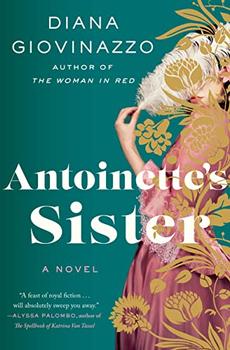Book Club Discussion Questions
In a book club? Subscribe to our Book Club Newsletter!
Please be aware that this discussion guide will contain spoilers!
- What did you know about Maria Carolina Charlotte before reading the novel? Did you know she was the sister of Marie Antoinette or that she was the queen of Naples? What surprised you the most as you were reading?
- In an age when men dominated the political landscape, Charlotte's mother, Empress Maria Theresa (1717–1780)—archduchess of Austria, queen of Hungary and Bohemia, and Holy Roman empress—was regarded as a shrewd, formidable, and influential ruler. Her dedication to governance, however, often took precedence over her role as a caregiver, as evidenced by the quote "I am a queen before I am a mother." Discuss the nature of Charlotte's relationship with her mother. In what ways was Maria Theresa a role model? In what ways did she fall short as a guiding influence—or do you not believe that she did?
- When Charlotte was a child, her mother lamented her passionate and free-spirited nature, going so far as to call her "impetuous" and "selfish." Later in Charlotte's life, however, after she takes the throne of Naples, Maria Theresa describes her as "witty" and "charming." Describe the evolution of Charlotte's character, from her betrothal to Ferdinand at the age of fifteen to her death at the age of sixty-two. What prompted Charlotte's transformation from rebellious teenager to headstrong ruler?
- Charlotte and Antoinette are described as being very similar to each other in their youth, in both looks and temperament, yet their approach to their respective monarchies was very different. What were each woman's greatest virtues as rulers? What were their greatest vices? What do you believe were the pivotal factors that led each woman to lose her throne?
- Maria Theresa gave birth to seventeen children during her lifetime; Charlotte gave birth to sixteen. The perpetuation of the royal line was paramount to both women, and most children in the family grew up and left to secure alliances with other dynastic lineages. Discuss the sense of home and homeland in the novel, the advice Maria Theresa and Charlotte dispensed to their daughters on their wedding days, and the push and pull royals often faced between personal and political duty.
- In chapter 13, Charlotte says this of her first daughter, Theresa: "I wanted so much to simply love my daughter. To love her without any sense of duty. Without any sense that she needed to be something more than what she was." How did Charlotte's childhood in Austria impact her perception of motherhood? How would you approach raising a future leader of Europe? Would your approach be most similar to that of Maria Theresa, Charlotte, or Antoinette? Why?
- In chapter 14, Leopold tells Charlotte that "chess is a lot like life." His first lesson: Always anticipate the actions of your opponent. His second lesson: The queen is the most important player on the board. How did this scene foreshadow the events of the rest of the novel, especially regarding Charlotte's dealings with Tanucci?
- In chapter 16, after giving birth to a son, Charlotte is finally granted her place on the council. Discuss the many ways in which Charlotte had to fight for her position as queen, despite the fact that she was a more prepared ruler than Ferdinand. At which point did she exert her influence for the first time to great effect?
- What does it mean to be powerful in the novel? How is power wielded, seized, abused, and delegated by Maria Theresa, Charlotte, Ferdinand, Tanucci, and Napoleon? In your view, who is the most powerful character in the novel?
- Describe the relationship between Antoinette and Charlotte. How did they influence and support each other throughout their lives? What challenges did they both face in their roles—and where did their difficulties diverge?
- In chapter 19, Charlotte remarks that Ferdinand prefers to "play innkeeper or dairy farmer" away from the palace, rather than attend to his royal duties. Similarly, Marie Antoinette commissioned a private French "farm" for herself at Versailles, where she and her ladies would pretend to be milkmaids and shepherdesses. Why do you think Ferdinand and Antoinette gravitated toward this kind of playacting? How else did the monarchs in the novel escape from their royal responsibilities?
- In chapter 20, Charlotte is exposed to the burgeoning Enlightenment philosophy of "poetry that sang of free ideas, of the relationship of science to art, of government's responsibility to its people." How did Charlotte incorporate these principles into her governance of Naples? How else did she aspire to transform her country into a "beacon of innovation"?
- The notion of a monarch's divine right to rule—the belief that monarchs are chosen for their positions by God—is broached in chapter 19 and 20. How does this concept directly contradict the ideals put forth during the French Revolution, which ultimately led to the executions of Marie Antoinette and her husband, Louis XVI ?
- How would the events of the novel be different if they were narrated from Ferdinand's point of view? How does he perceive the world around him? Does he love Charlotte and his children? Do you believe Ferdinand had any wish to transform the society of Naples, or do you believe he was consumed entirely by the pursuit of selfish pleasures?
- How did you feel about Charlotte's relationship with Acton? Do you believe the two loved one another? Would he have been a better match for Charlotte than Ferdinand?
Download the full book club kit
Unless otherwise stated, this discussion guide is reprinted with the permission of Grand Central Publishing.
Any page references refer to a USA edition of the book, usually the trade paperback version, and may vary in other editions.
